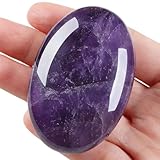The amethyst stone is an incredibly powerful crystal used for centuries for its healing properties. It provides a sense of calm and balance and is commonly used for meditation, relaxation, and protection.
However, it is important to be aware of any potential side effects of amethyst stone before deciding to use it for healing purposes.
In this blog post, we will be exploring the possible side effects of this potent crystal so that you can make an educated decision when using amethyst stone. We will discuss the possible physical, mental, and spiritual side effects of using the amethyst stone.
We will also discuss ways to minimize the chance of experiencing any of these side effects. By the end of this blog post, you should better understand the possible side effects of amethyst stone and be able to use this powerful crystal safely.
What Are the Possible Side Effects of Amethyst Stone?
While amethyst stone is a very powerful stone, some people may experience at least one of the possible side effects of amethyst stone listed below.
- Skin irritation
- Nausea
- Headache
- Insomnia
- Anxiety
- Stress
- Overstimulation
- Inflammation
- 【Multi-functional Palm Stones】: relaxation, energy enhancement, protection and meditation. Holding a palm stone in your hand creates a strong connection between the stone’s energy and your energy field or aura. Holding an oval stone with a calming vibe brings you moments of peace and tranquility . Use it in your daily spiritual practice, there are various stones with high vibrations that can help us enter a deep meditative state.
- 【Healing Crystal Stones Specifications】: 2.4 inches , Weight: 0.15-0.33 lbs. Because of their oval or round shape, you can easily slip them into your purse or pocket to carry with you throughout the day.Holding palmetto stone can create a powerful connection between our being and crystalline energy. Holding a palm stone can bring us a moment of peace and calm.
- 【Benefits of Amethyst】: Amethyst helps encourage us to grow in the direction of higher potential and spiritual expansion.
Last update on 2024-12-25 // Source: Amazon Affiliates
1. Side Effects of Amethyst Stone: Skin irritation
One of the possible side effects of amethyst stone is skin irritation.
This may be due to the fact that it has a crystal structure, and its sharp edges may cause an uncomfortable feeling when touched.
It is also possible that some particles may be absorbed into the skin, which can lead to itchiness or redness.
To minimize the risk of skin irritation, it is recommended to use the stone sparingly and to wear gloves when handling it. It is also essential to ensure the stone is clean and dust-free before use.
2. Side Effects of Amethyst Stone: Nausea
Nausea is a possible side effect of amethyst stone. Individuals using amethyst stones for healing or spiritual purposes may experience nausea after exposure to the stone.
Nausea commonly occurs when the individual is sensitive to the stone’s energy or when the stone’s energy is too strong.
If nausea occurs, the individual should take a break from using the stone and allow their body to readjust.
If nausea persists, consult a physician for further advice.
3. Side Effects of Amethyst Stone: Headache
One of the possible side effects of amethyst stone is a headache.
Headaches can be caused by wearing or holding the amethyst stone for prolonged periods, or those with sensitive skin can lead to irritation and discomfort.
Some people have reported experiencing headaches due to the amethyst’s natural electromagnetic energy.
However, this is usually short-lived and can be easily remedied by reducing the amount of time spent with the stone.
If headaches persist, it is advised to discontinue use and seek medical advice.
- [ HANDMADE AMETHYST CRYSTAL PENDANT ] The medium natural amethyst stone geode cave cluster necklace perfect use for meditation, reiki healing, absorb negative energy, protection, witchcraft. It is much prettier in person especially when you wear it. Rough, natural and dainty! You will never regret it!
- [ NATURAL MATERIAL ] Natural stone pendant,crystal cluster necklace,quartz cluster necklace,raw quartz,healing crystals,rough stone. Shape:Irregular,Raw,Rough;Chakras:Third Eye Chakra, Crown Chakra; Color: Purple; Birthstone:February.
- [ SIZE DETAILS ] Size of the pendant is approximately 0.78″-1.57″; Weight is approximately 0.07lb; Chain length is about 19″-22″; Quantity:1Pc. Kind Reminder: Each Amethyst Crystal Geode is natural and irregular that the color and shape is slightly different from pictures, please subject to the actual product you received.
Last update on 2024-12-25 // Source: Amazon Affiliates
4. Side Effects of Amethyst Stone: Insomnia
Insomnia is a common side effect of amethyst stone use.
Amethyst stone has been known to increase feelings of relaxation, which can positively affect insomnia.
However, it can also have an adverse effect, leading to difficulty falling or staying asleep.
If you are prone to insomnia, it is best to limit your exposure to amethyst stones to earlier in the day to avoid disrupting your sleep.
Additionally, you should speak with your doctor if you are experiencing serious insomnia, as other treatments may help.
5. Side Effects of Amethyst Stone: Anxiety
Anxiety is one of the most common side effects associated with amethyst stone use.
In some cases, users can experience an intense feeling of uneasiness and fear that can interfere with their daily routine and functioning.
Anxiety can also manifest as racing thoughts, restlessness, and difficulty concentrating.
It is important to note that these symptoms are usually short-lived and disappear after a few days of use.
However, if you experience prolonged anxiety, you should stop using the stone and speak to your doctor.
6. Side Effects of Amethyst Stone: Stress
While Amethyst is known for its calming and healing properties, an excessive or sudden buildup of the gemstone can lead to an unhealthy increase in stress levels.
Stress is the body’s response to any change or challenge, and long-term stress can negatively impact physical and emotional health.
Prolonged stress can lead to headaches, fatigue, chest pain, high blood pressure, and depression.
To avoid any adverse effects, increasing the use of Amethyst gradually is recommended.
- Premium Quality Crystals and Healing Stones : Our Amethyst Worry Stone is crafted from authentic amethyst crystals and stones, making it a valuable addition to your collection of meditation accessories and reiki supplies for optimal energy alignment.
- Ideal Meditation Accessories : Enhance your mindfulness sessions with our worry stone, perfect for meditation and stress relief. This piedra original helps in grounding and balancing your energies, serving as a vital tool for stress relief items.
- Thoughtful Mental Health Gifts : Our Amethyst Worry Stone makes an excellent choice among mental health gifts and stress relief gifts, designed to offer emotional balance and tranquility. It is an ideal palm stone for those seeking Relaxation.
Last update on 2024-12-25 // Source: Amazon Affiliates
7. Side Effects of Amethyst Stone: Overstimulation
Overstimulation is one of the potential side effects of Amethyst Stone.
This can include feeling energized, anxious, and overwhelmed. In some cases, it can also cause headaches and migraines.
To minimize these effects, it is important to keep your exposure to the stone to a minimum.
Further, it is best to avoid using the stone for extended periods or in an environment that can be overly stimulating.
If you are feeling overwhelmed or overstimulated, it is best to remove the stone from your person and take a break.
8. Side Effects of Amethyst Stone: Inflammation
One of the potential side effects of amethyst stones is inflammation, which can range from mild to severe.
Those with any existing inflammatory disorders should consult a medical professional before using amethyst stones.
Additionally, those using amethyst stones should pay attention to any signs of inflammation, such as redness, heat, or swelling in the affected area.
If any of these symptoms occur after using amethyst stones, discontinue use and consult with a medical professional.
In conclusion, the healing properties of the amethyst stone are vast, and the side effects, if any, are generally minor and short-term.
People have used the stone for centuries for spiritual, emotional, and physical healing.
While there are some potential risks, the benefits are usually much greater.
If you are considering using an amethyst stone, speak to your doctor or a certified health professional to ensure it is a safe and beneficial choice for you.




